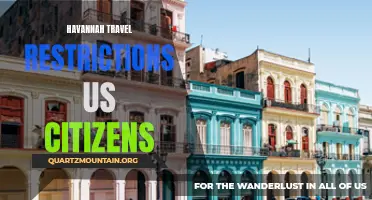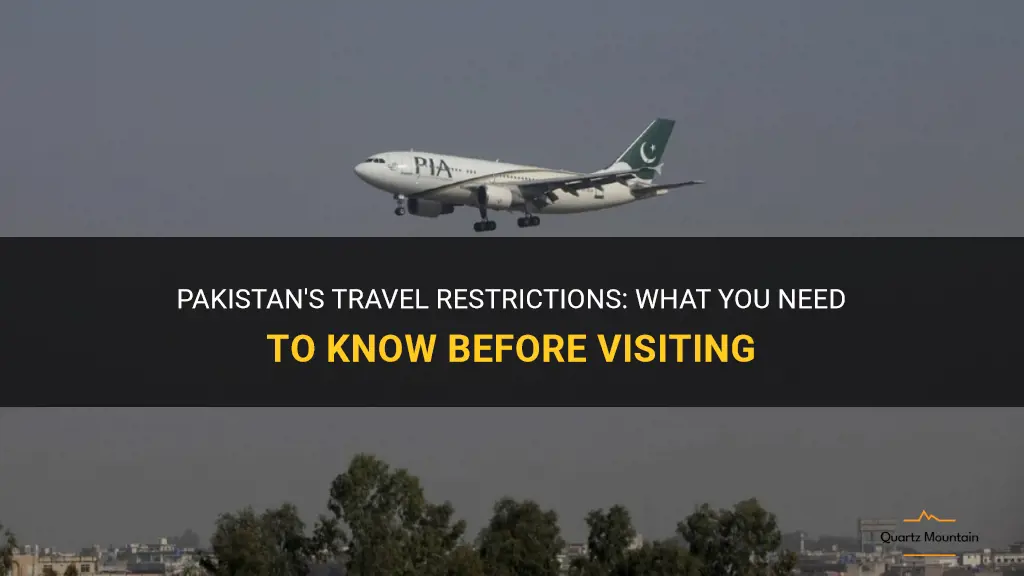
As the world starts to slowly emerge from the grip of the COVID-19 pandemic, countries continue to implement travel restrictions to ensure the safety of their citizens. One country that has been closely monitoring its borders and air routes is Pakistan. With its diverse landscape, rich history, and warm hospitality, Pakistan has always attracted travellers from all over the world. However, with the ongoing global health crisis, travel restrictions to Pakistan have been put in place, creating unique challenges for both tourists and residents alike. In this article, we will explore the various restrictions, protocols, and guidelines that have been implemented, shedding light on the current state of travel to Pakistan in these unusual times.
What You'll Learn
- What are the current travel restrictions to Pakistan due to the COVID-19 pandemic?
- Are there any specific entry requirements or documentation needed to travel to Pakistan during the pandemic?
- Are there any travel restrictions or advisories for specific regions or cities within Pakistan?
- Are there any quarantine or testing requirements for travelers arriving in Pakistan?
- Are there any restrictions on outbound travel from Pakistan?

What are the current travel restrictions to Pakistan due to the COVID-19 pandemic?
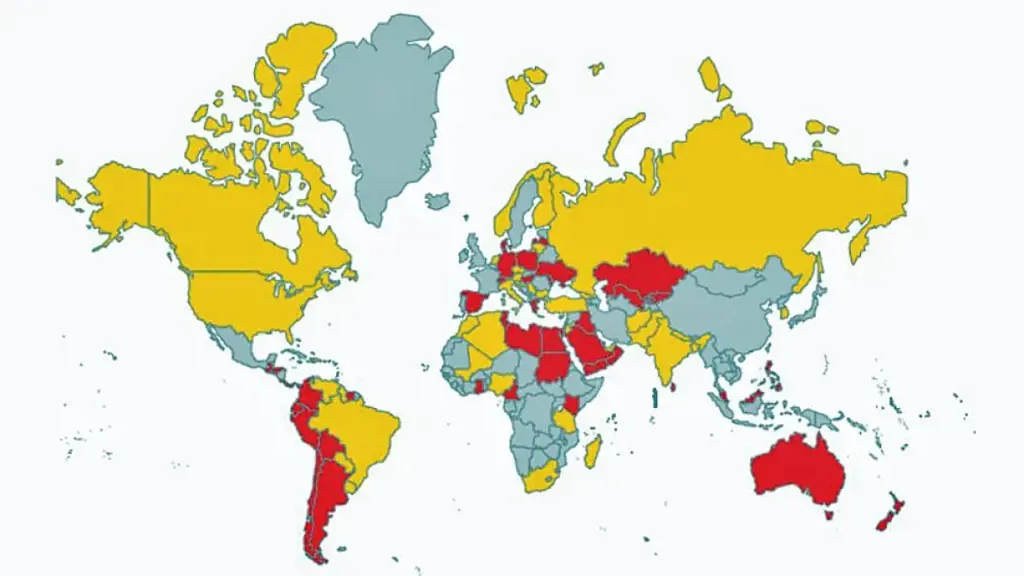
As the world continues to grapple with the ongoing COVID-19 pandemic, countries around the globe have implemented various travel restrictions to curb the spread of the virus. Pakistan, like many other nations, has also imposed travel restrictions to protect its citizens and prevent the transmission of the virus within its borders.
Currently, there are several travel restrictions in place for individuals planning to travel to Pakistan. These restrictions may vary depending on the country of origin and the purpose of travel. It is essential for travelers to stay updated on the latest requirements before planning their trip.
International Travel:
- All international travelers, except for Pakistani nationals, are required to provide a negative PCR test result conducted within 72 hours before their departure to Pakistan.
- Passengers from Category C countries, including Botswana, Eswatini, Lesotho, Mozambique, Namibia, South Africa, Zambia, and Zimbabwe, are banned from entering Pakistan.
- Passengers from Category B countries, including Australia, Bangladesh, Bhutan, Brazil, Colombia, Ethiopia, Fiji, India, Indonesia, Iraq, Kazakhstan, Kenya, Mexico, Myanmar, Nepal, Nigeria, Norway, Philippines, Rwanda, Singapore, South Korea, Sri Lanka, Tajikistan, Tanzania, Thailand, Trinidad and Tobago, Tunisia, Uganda, Ukraine, United Arab Emirates (Dubai only), United Kingdom, United States, Uzbekistan, Vietnam, and Zimbabwe are allowed to travel to Pakistan with specific guidelines such as mandatory COVID-19 testing upon arrival.
Domestic Travel:
- Domestic flights within Pakistan have resumed, but passengers are required to follow strict protocols such as wearing masks, maintaining social distancing, and practicing good hand hygiene.
- Some provinces within Pakistan may also have additional travel restrictions and quarantine requirements in place. Travelers should check with the local authorities for the latest guidelines before planning their domestic journeys.
It is important to note that these travel restrictions are subject to change and may be updated depending on the evolving situation of the pandemic. Travelers are advised to regularly check official government sources and consult with airlines or travel agents for the most up-to-date information before embarking on their journey to Pakistan.
In conclusion, Pakistan, like many other countries, has implemented travel restrictions to mitigate the transmission of COVID-19. These restrictions include mandatory testing, bans on travelers from certain countries, and guidelines for domestic travel. Travelers should stay informed and follow the necessary protocols to ensure a safe and hassle-free journey.
Travel Restrictions between Thailand and India: What You Need to Know
You may want to see also

Are there any specific entry requirements or documentation needed to travel to Pakistan during the pandemic?
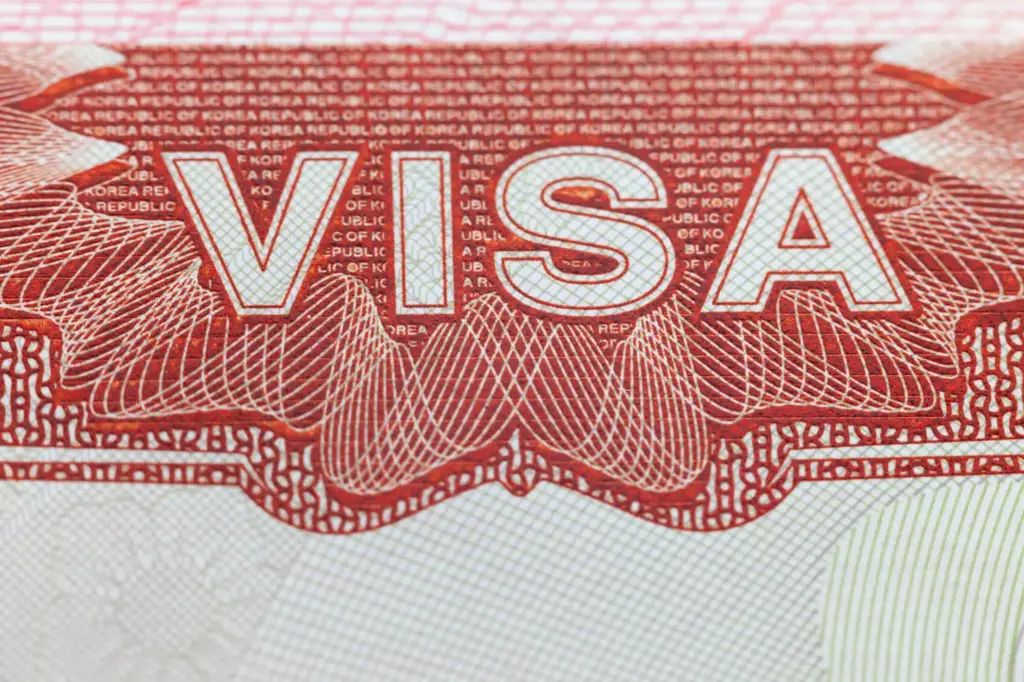
Traveling to Pakistan during the pandemic requires specific entry requirements and documentation to ensure the safety of both travelers and the local population. The Pakistani government has implemented several guidelines and restrictions to prevent the spread of COVID-19. Here is what you need to know before planning your trip to Pakistan.
- Negative COVID-19 Test: All travelers, regardless of their vaccination status, must provide a negative COVID-19 PCR test result taken within 72 hours before the start of their journey to Pakistan. This requirement applies to all passengers aged 6 and above.
- Online Health Declaration: Before boarding your flight to Pakistan, you must fill out an online Health Declaration Form available on the Pakistan International Airlines (PIA) website. This form requires you to provide your personal information, travel details, and declare your COVID-19 status.
- Quarantine Requirements: Upon arrival in Pakistan, all passengers will undergo health screening, including a temperature check. If you exhibit symptoms or test positive for COVID-19 upon arrival, you may be required to quarantine at a designated facility or self-isolate at your accommodation, depending on the severity of your condition.
- Health Insurance: It is highly recommended to have adequate travel health insurance that covers COVID-19-related medical expenses. This will provide you with financial protection in case you require medical assistance or hospitalization during your stay in Pakistan.
- Vaccination Status: While vaccination is not a mandatory requirement for entry into Pakistan, having received the COVID-19 vaccine can help facilitate your travel. Some airlines may prioritize vaccinated passengers or have different entry requirements for fully vaccinated individuals.
- Additional Travel Restrictions: Depending on the situation, the Pakistani government may impose additional travel restrictions, such as lockdowns, curfews, or specific entry requirements for travelers coming from high-risk countries. It is crucial to stay updated with the latest travel advisories and guidelines provided by relevant authorities before planning your trip.
- Face Masks and Sanitization: Wearing face masks in public places is mandatory in Pakistan. Additionally, travelers are advised to maintain good hygiene practices, such as regular handwashing, using hand sanitizers, and practicing social distancing whenever possible.
It is essential to note that the entry requirements and travel restrictions may vary depending on your nationality, purpose of visit, and the specific region within Pakistan you intend to travel to. Therefore, it is advisable to consult with the nearest Pakistani embassy or consulate and check travel advisories issued by the government before making any travel arrangements.
Remember, the situation regarding COVID-19 is continuously evolving, and travel guidelines are subject to change at short notice. Stay informed, follow the recommended protocols, and prioritize your health and safety when planning and undertaking travel to Pakistan during the pandemic.
Exploring Japan in the New Normal: Travel Restrictions and Guidelines
You may want to see also

Are there any travel restrictions or advisories for specific regions or cities within Pakistan?
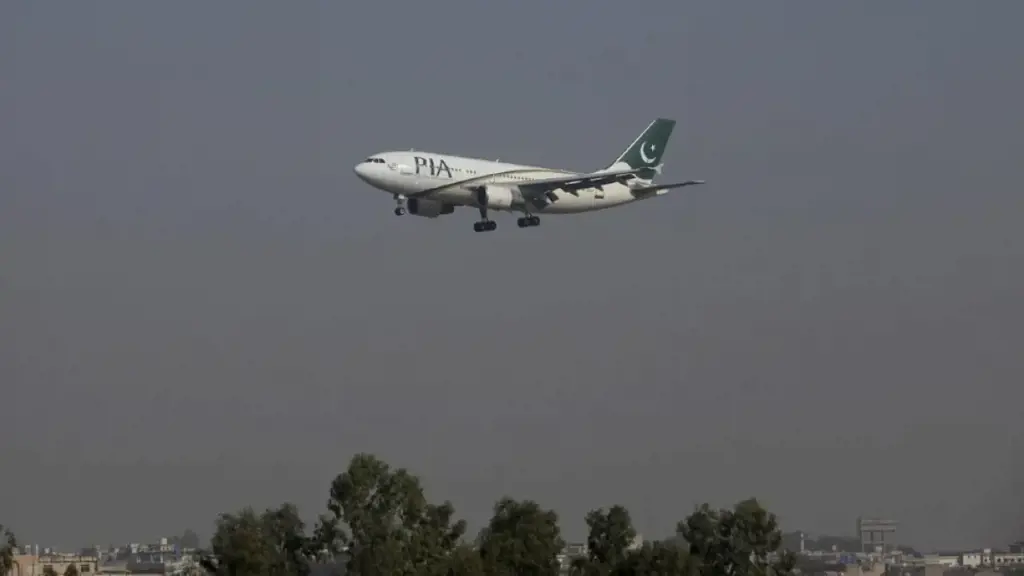
As the world continues to deal with the COVID-19 pandemic, many countries have implemented travel restrictions and advisories to help control the spread of the virus. Pakistan, like most countries, has also taken measures to ensure the safety of its citizens and visitors. However, the travel restrictions and advisories in Pakistan are not uniform for the entire country, but instead, they vary depending on the specific regions or cities.
Pakistan has a tiered system in place to categorize regions and cities based on the level of COVID-19 transmission and the risk associated with each region. The country is divided into three categories: A, B, and C, with category A having the lowest risk and category C having the highest risk.
For regions or cities in category A, there are generally no travel restrictions or advisories in place. These are areas with a lower number of COVID-19 cases and a low transmission rate. Travelers can freely visit these regions, but it is still advised to follow all necessary health protocols, such as wearing masks and practicing social distancing.
Regions or cities in category B have a moderate risk of COVID-19 transmission. Travelers are allowed to visit these areas, but there may be certain restrictions in place, such as the need to provide a negative COVID-19 test result or undergo quarantine upon arrival. It is important to check the specific requirements for each region or city before planning a visit.
Regions or cities in category C have a high risk of COVID-19 transmission. Travel to these areas is generally discouraged unless it is essential. If travel is necessary, strict measures may be in place, including mandatory quarantine upon arrival and additional testing requirements.
It is important to note that the categorization of regions and cities can change based on the evolving COVID-19 situation. The government regularly reviews the situation and updates the categorization accordingly. Travelers should stay updated with the latest information from credible sources, such as the Ministry of Health and the local authorities, before planning their travel.
In addition to the regional categorization, Pakistan has also implemented other measures to control the spread of the virus. These include the mandatory wearing of masks in public places, the closure of certain businesses and amenities during specific hours, and restrictions on large gatherings.
Travelers planning to visit Pakistan should also check the specific requirements for entry into the country. This may include the need to provide a negative COVID-19 test result, undergo quarantine upon arrival, or obtain a visa in advance. Again, it is important to stay updated with the latest information as the requirements can change.
As the COVID-19 situation continues to evolve, it is essential to prioritize the health and safety of oneself and others. Travelers should follow all necessary health protocols and guidelines, both before and during their visit to Pakistan. By staying informed and taking the necessary precautions, travelers can have a safe and enjoyable trip to Pakistan.
Scotland Updates International Travel Restrictions in Response to COVID-19
You may want to see also

Are there any quarantine or testing requirements for travelers arriving in Pakistan?
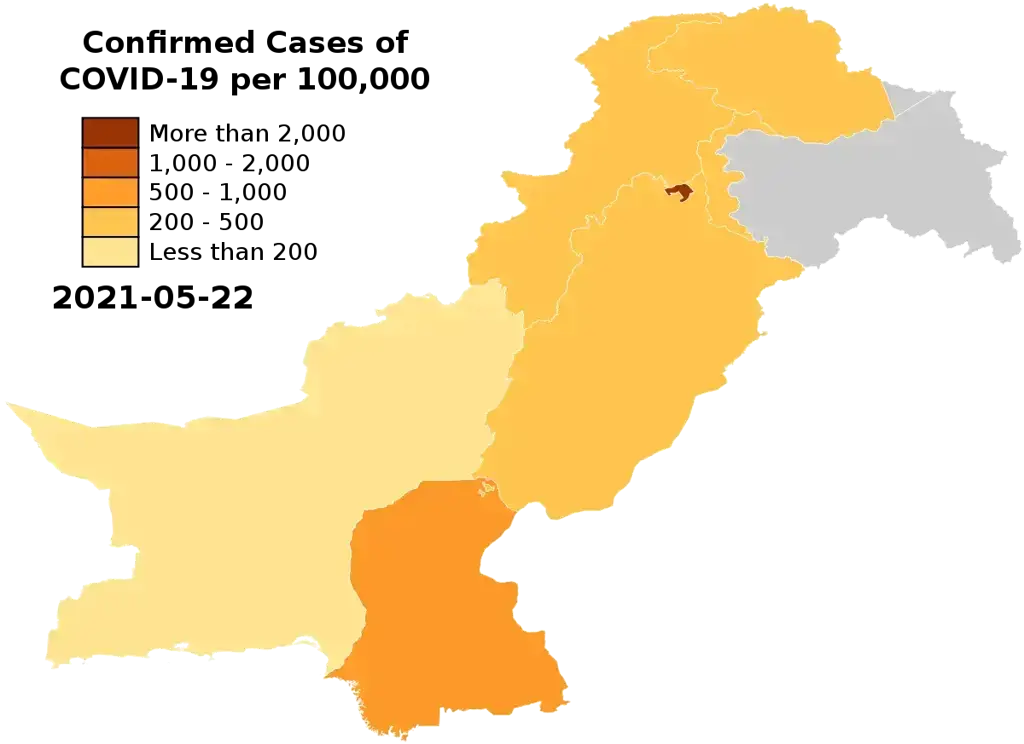
As a result of the ongoing COVID-19 pandemic, many countries have implemented travel restrictions and requirements to help prevent the spread of the virus. If you are planning to travel to Pakistan, it is important to be aware of the quarantine and testing requirements in place.
Currently, travelers who are fully vaccinated against COVID-19 and have received the final dose at least 14 days prior to their arrival do not need to quarantine upon entry into Pakistan. However, they must provide proof of vaccination, such as a vaccination certificate or card, and fill out a health declaration form.
For travelers who are not fully vaccinated, the quarantine requirements vary depending on their country of origin. According to the latest updates from the Government of Pakistan, travelers from a Category A country are exempt from quarantine. These countries are considered low-risk for COVID-19 transmission. However, travelers from Category B and C countries are required to quarantine for a period of 10 days upon arrival. The list of countries in each category may be subject to change, so it is essential to check for any updates before traveling.
In addition to the quarantine requirements, all travelers entering Pakistan, regardless of their vaccination status, are required to undergo a COVID-19 test. This test must be taken within 72 hours prior to their departure for Pakistan. The test result must be negative, and travelers must present the original test report in English or with a notarized translation in order to board their flight.
It is important to note that these requirements are subject to change at any time, depending on the evolving situation of the pandemic. Therefore, it is advisable to check the official website of the Government of Pakistan or consult with the nearest Pakistani embassy or consulate for the most up-to-date information before making travel plans.
Furthermore, it is crucial to follow all health and safety guidelines while traveling, such as wearing masks, practicing physical distancing, and regularly sanitizing hands. Compliance with these guidelines not only protects individuals but also helps in preventing the spread of COVID-19 within communities.
In conclusion, travelers arriving in Pakistan are subject to quarantine and testing requirements. Fully vaccinated individuals do not need to quarantine but must provide proof of vaccination. Non-vaccinated individuals may be required to quarantine depending on their country of origin. Additionally, all travelers must undergo a COVID-19 test within 72 hours prior to their departure for Pakistan. It is essential to stay informed about any changes in these requirements and follow all health and safety measures to ensure a safe and smooth travel experience.
Exploring Tel Aviv: Navigating Travel Restrictions Amidst the Pandemic
You may want to see also

Are there any restrictions on outbound travel from Pakistan?
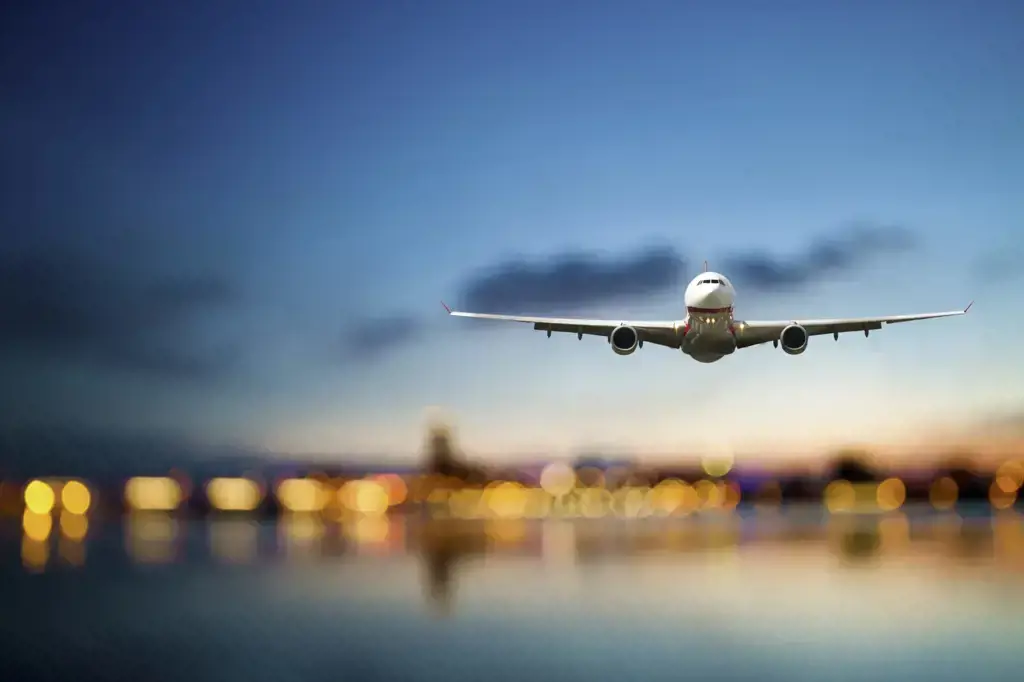
Due to the ongoing COVID-19 pandemic, many countries have implemented travel restrictions to contain the spread of the virus. Pakistan is no exception. The government of Pakistan has imposed several restrictions on outbound travel for its citizens.
Firstly, it should be noted that the situation is fluid and subject to change. The restrictions on outbound travel from Pakistan can vary depending on the current COVID-19 situation both in Pakistan and in the destination country.
One of the key restrictions is the requirement of a negative COVID-19 test result before boarding the flight. Passengers are required to provide a negative PCR test result, taken within a specific timeframe prior to their departure. The timeframe may vary from 48 to 72 hours, so it is important to check with the airline or embassy for the specific requirements.
Additionally, travelers are often required to fill out health declaration forms and provide contact information for contact tracing purposes. Some countries may also require mandatory quarantine upon arrival or have specific entry requirements such as proof of vaccination or additional testing.
It is important for travelers to stay updated on the latest travel advisories and restrictions, as they can change rapidly. The Ministry of Foreign Affairs and the embassies of respective countries can provide the most accurate and up-to-date information regarding restrictions on outbound travel.
In addition to COVID-19 related restrictions, there may also be specific visa requirements or travel bans imposed by certain countries. It is advisable to check the visa requirements and any travel bans before making any travel plans.
Travelers should also be aware of any travel advisories issued by their respective governments. These advisories provide valuable information about the security situation in different countries and can help travelers make informed decisions about their travel plans.
Finally, it is important to note that traveling during the pandemic carries certain risks. It is crucial to follow all necessary precautions, such as wearing masks, maintaining social distancing, and practicing good hygiene to minimize the risk of contracting or spreading the virus.
In conclusion, there are several restrictions on outbound travel from Pakistan due to the COVID-19 pandemic. These restrictions include the requirement of a negative COVID-19 test result, health declaration forms, and possibly mandatory quarantine or specific entry requirements. Travelers should stay updated on the latest travel advisories and restrictions, as they are subject to change. It is also important to follow all necessary precautions to minimize the risk of contracting or spreading the virus while traveling.
Exploring the Latest Travel Restrictions to El Salvador: What You Need to Know
You may want to see also
Frequently asked questions
Yes, Pakistan has implemented travel restrictions to help prevent the spread of COVID-19. All international travelers are required to undergo a mandatory 10-day quarantine upon arrival in Pakistan. Additionally, a negative COVID-19 PCR test taken within 72 hours of travel is required for all passengers.
Yes, Pakistani citizens living abroad are allowed to travel to Pakistan. However, they must comply with the travel restrictions in place, such as providing a negative COVID-19 PCR test result and undergoing quarantine upon arrival.
Yes, domestic travel within Pakistan is currently allowed. However, it is important to adhere to the safety guidelines and protocols set by the government and health authorities, such as wearing masks, practicing social distancing, and avoiding crowded places.
Some countries may require a negative COVID-19 test result taken within a specific time frame before departure. It is important to check the travel requirements of your destination country and comply with any pre-departure testing or documentation requirements. Additionally, it is advisable to contact your airline or travel agency for any specific requirements or guidelines for departing from Pakistan.





